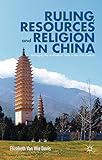Ruling Resources and Religion in China : managing the multiethnic state in the 21st century / Elizabeth Van Wie Davis.
By: Davis, Elizabeth Van Wie [author.].
Publisher: UK : Palgrave MacMillan, 2013Description: xiv, 182p.ISBN: 9781137033833.Subject(s): China | Politics and government | Minorities | Natural resources | Religion | Minorities -- Government policy | Minorities -- Social conditions | MulticulturalismDDC classification: 951.06 Summary: China is not an easy country to rule: it is experiencing rapid growth and with it rapid social change. Resources and religion are two of the most difficult of its challenges, and their combination with ethnicity is not unique to China. It may well be one of the major underlying currents of the 21st century and is present throughout Asia—with the Baloch of Pakistan, the Kurds of Iraq and Turkey, and the Timorese of the former island of East Timor in Indonesia, now Timor-Lest. In all these nations, as in China, ethnic identity, often united with religious differences, is driven by the presence of valuable resources to create a nationalism with economic underpinnings. However, as Van Wie Davis shows, with China the outcome is vital, as how it copes with the pressures for good governance with the Asian economic model, treats its ethnic minorities under scrutiny, and gathers resources to fuel its dynamic economy impacts us all.| Item type | Current location | Call number | Status | Date due | Barcode |
|---|---|---|---|---|---|
 Books
Books
|
NASSDOC Library | 951.06 DAV-R (Browse shelf) | Available | 52640 |
Includes bibliographical references and index.
China is not an easy country to rule: it is experiencing rapid growth and with it rapid social change. Resources and religion are two of the most difficult of its challenges, and their combination with ethnicity is not unique to China. It may well be one of the major underlying currents of the 21st century and is present throughout Asia—with the Baloch of Pakistan, the Kurds of Iraq and Turkey, and the Timorese of the former island of East Timor in Indonesia, now Timor-Lest. In all these nations, as in China, ethnic identity, often united with religious differences, is driven by the presence of valuable resources to create a nationalism with economic underpinnings. However, as Van Wie Davis shows, with China the outcome is vital, as how it copes with the pressures for good governance with the Asian economic model, treats its ethnic minorities under scrutiny, and gathers resources to fuel its dynamic economy impacts us all.
English.


There are no comments for this item.